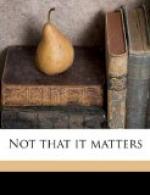These games may be divided broadly into two classes; namely, paper games and guessing games. The initial disadvantage of the paper game is that pencils have to be found for everybody; generally a difficult business. Once they are found, there is no further trouble until the game is over, when the pencils have to be collected from everybody; generally an impossible business. If you are a guest in the house, insist upon a paper game, for it gives you a chance of acquiring a pencil; if you are the host, consider carefully whether you would not rather play a guessing game.
But the guessing game has one great disadvantage too. It demands periodically that a member of the company should go out by himself into the hall and wait there patiently until his companions have “thought of something.” (It may be supposed that he, too, is thinking of something in the cold hall, but perhaps not liking to say it.) However careful the players are, unpleasantness is bound to arise sometimes over this preliminary stage of the game. I knew of one case where the people in the room forgot all about the lady waiting in the hall and began to tell each other ghost stories. The lights were turned out, and sitting round the flickering fire the most imaginative members of the household thrilled their hearers with ghostly tales of the dead. Suddenly, in the middle of the story of Torfrida of the Towers—a lady who had strangled her children, and ever afterwards haunted the battlements, headless, and in a night-gown—the door opened softly, and Miss Robinson entered to ask how much longer they would be. Miss Robinson was wearing a white frock, and the effect of her entry was tremendous. I remember, too, another evening when we were playing “proverbs.” William, who had gone outside, was noted for his skill at the game, and we were determined to give him something difficult; something which hadn’t a camel or a glass house or a stable door in it. After some discussion a member of the company suggested a proverb from the Persian, as he alleged. It went something like this: “A wise man is kind to his dog, but a poor man riseth early in the morning.” We took his word for it, and, feeling certain that William would never guess, called him to come in.
Unfortunately William, who is a trifle absentminded, had gone to bed.
To avoid accidents of this nature it is better to play “clumps,” a guessing game in which the procedure is slightly varied. In “clumps” two people go into the hall and think of something, while the rest remain before the fire. Thus, however long the interval of waiting, all are happy; for the people inside can tell each other stories (or, as a last resort, play some other game) and the two outside are presumably amusing themselves in arranging something very difficult. Personally I adore clumps; not only for this reason, but because of its revelation of hidden talent. There may be a dozen persons in each clump, and in theory every one of the dozen




